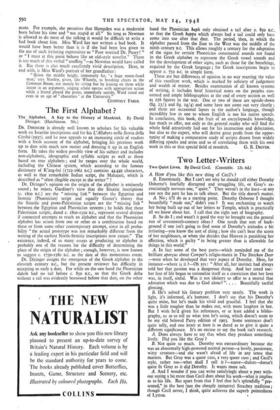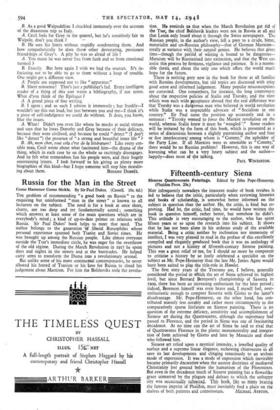Two Letter-Writers
Two Quiet Lives. By David Cecil. (Constable. 12s. 6d.)
A. How d'you like this new thing of Cecil's ?
B. Enormously. But I can't see why he should call either Dorothy Osborne's fearfully disrupted and struggling life, or Gray's ex- cruciatingly nervous one, " quiet." They weren't in the least—at any rate not the part he has to talk about. But the title doesn't matter.
A. No ; it'll do as a starting point. Dorothy Osborne I thought beautifully "made out," didn't you ? It was enchanting to watch her being built up out of her letters to Temple, which is practically all we know about her. I call that the right sort of biography.
B. So do I ; and wasn't it good the way he brought out the general run of seventeenth-century ideas ? One needs that sort of back- ground if one isn't going to find some of Dorothy's attitudes a bit irritating—you know the sort of thing ; how she can't bear the scorn of her neighbours, or when she decides that Heaven is punishing her affection, which is guilty " in being greater than is allowable for things in this world."
A. In fact some of the best parts—which reminded me of the brilliant apereus about Cowper's religio-mania in The Stricken Deer —were when he developed that very aspect of Dorothy. Here, for instance—where is it ?—Oh yes: "After all, her instinct had always told her that passion was a dangerous thing. And her creed too: her fear of life began to rationalise itself as a conviction that her love was, in itself, sinful. Was it not idolatry to offer to a mortal that adoration which was due to God alone? ". . . . Beautifully tactful glossing.
B. He's solved his literary problem very neatly. The work is light, it's informed, it's humane. I don't say that his Dorothy's quite mine, but he's made his vivid and graceful. I feel that she was a little tougher than he makes out, with more laughter in her. But I wish he'd given his references, or at least added a biblio- graphy, so as to tell us what text he's using, which doesn't seem to be my old beloved Parry edition of 1903. Some sentences don't quite tally, and one letter at least is so dated as to give it quite a different significance. It's no excuse to say the book isn't research.
A. Dons always have to say that when they produce something lively. Did you like the Gray ?
B. Not quite so much. Dorothy was extraordinary because she was an abnormally high-powered normal person—a lovely, passionate, witty creature—and she wasn't afraid of life in any sense that
matters. But Gray was a queer cuss, a very queer cuss ; and Cecil's style, rather too—what shall I call it ?—suave—dulcet—cloesn't quite fit Gray as it did Dorothy. It wants more salt.
A. And I wonder if you can write satisfyingly about a poet with- out saying a bit more than Cecil does about his work—what it implies as to his life. But apart from that I feel that he's splendidly "pre- sented," in the best (not the cheaply imitative) Strachey tradition; though Cecil never, I think, quite achieves the superb pointedness of Lytton.
B. As a good Walpuddlian I chuckled immensely over the account of the disastrous trip to Italy.
A. Cecil feels for Gray in the quarrel, but he's sensitively fair to Walpole, don't you think ?
B. He sees his limits without stupidly condemning them. And how sympathetically he does those other devastating, passionate friendships of Gray's. A pity he was so afraid of life !
A. You mean he was never free from funk and so from emotional turmoil ?
B. Exactly. But here again I wish we had the sources. It's in- furiating not to be able to go to them without a heap of trouble. One might get a different view.
A. People are supposed not to like "apparatus."
B. Sheer nonsense! That's just a publisher's fad. Every intelligent reader of a thing of this sort wants a bibliography, if not notes. What d'you think of the Epilogue ?
A. A grand piece of fine writing. • B. I agree ; and as such I admire it immensely ; but frankly—I wouldn't say this out loud, but just between you and me—I think it's a piece of self-indulgence we could do without. It does, you know, blur the issues.
A. What! Didn't you even like where he mocks at social virtues and says that he loves Dorothy and Gray because of their delicacy, because they were civilised, and because he could "detect " (I don't like "detect ") the presence of " a strong and beautiful inner life "?
B. Ah, mon cher, tout cela c'est de la litterature! Like every sen- sible man, Cecil wrote about what fascinated him—the drama of the thing, which in each case he on the whole so excitingly disengages. And he felt what tremendous fun his people were, and their hugely entertaining letters. I look forward to his giving us plenty more biographies of this kind—but I hope someone will stop him moralis-































 Previous page
Previous page